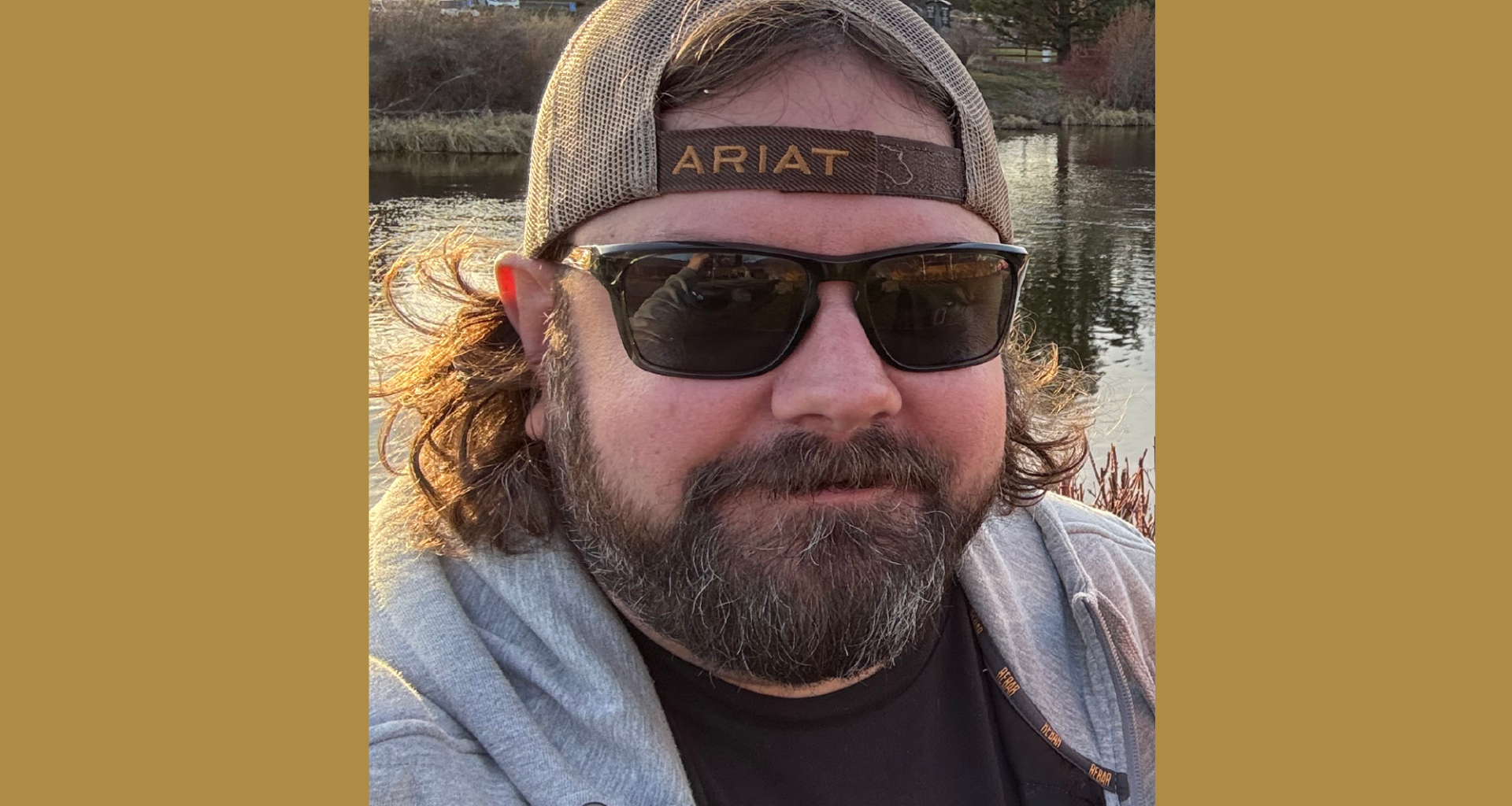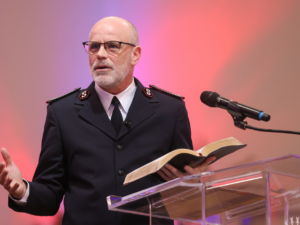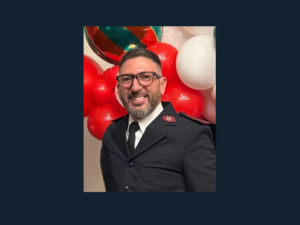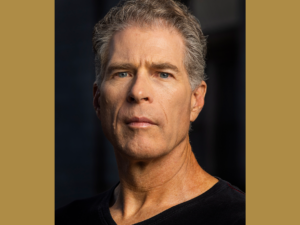It won’t come as a surprise to you that hundreds of thousands of veterans across America are affected by trauma—some from their time in military service, though not all—and yet, their needs remain deeply misunderstood by many of us who haven’t served.
Not all veterans experience post-traumatic stress disorder, and yet many do—in fact, some 29 percent of veterans who served in Iraq experience it at some point in their lives. Others face issues similar to those of the general population, from mental illness to substance abuse and even childhood experiences.
The need is not one-size-fits-all or even most, and the path to healing looks different for everyone too.
That’s what Chaplain Nate Lyons from The Salvation Army Veterans and Family Center in Beaverton, Oregon, helps us understand on today’s show. As an Iraq war veteran himself, Nate now serves as chaplain and activities coordinator for some 72 veterans and their families who are on their own journeys toward healing.
And the Veterans and Family Center isn’t just providing transitional housing, though that is certainly part of the picture. They’re also focusing on so-called “alternative therapies” that engage both the brain and body. We’re talking about gardening programs where veterans grow their own food. Hiking groups that get people into nature. Art classes, music therapy, even yoga and pickleball.
The Veterans and Family Center serves veterans from all eras of military service—from their 20s to their 80s, representing every branch of the military. It’s one of the only centers in the region that welcomes veterans with children, partners and even their animals.
And today, Nate is taking us inside this special place of veteran care.
We’ll also explore the harder questions: How do you minister to veterans who may have lost their faith because of what they experienced? What does it mean to serve fellow veterans when you’re on your own healing journey? And how do you measure success when the path to wellness isn’t always linear?
Whether you’re a veteran yourself, love someone who has served, or simply want to understand how some approaches to trauma recovery are changing lives, this conversation is going to challenge how you think about healing, hope and the power of community.
Show highlights include:
- What The Salvation Army Veterans and Family Center in Beaverton, Oregon, does.
- How Nate Lyons became chaplain at this center.
- Signs there is some trauma impacting a veteran’s daily life.
- Why assistance is not a one size fits all type of experience.
- “Alternative” therapies found at the Veterans and Family Center.
- How the family atmosphere impacts the healing that goes on at the center.
- What “success” looks like for Nate.
- What Nate would want a struggling veteran to know.
Listen and subscribe to the Do Gooders Podcast now. Below is a transcript of the episode, edited for readability. For more information on the people and ideas in the episode, see the links at the bottom of this post.
* * *
Nate Lyons: I am Nate Lyons. I am the chaplain at The Salvation Army Veterans and Family Center in Beaverton, Oregon.
Christin Thieme: For anybody who’s not as familiar with what that center is and does, can you help us just set the scene for what goes on there at the Veterans and Family Center?
Nate Lyons: Yeah. Essentially, it’s transitional housing for unhoused veterans and their families. So we’re one of the only places that will allow veterans to live in our facility with their families. We’re not a shelter and we’re not a hotel, but like I said, we’re a pretty nice facility that offers transitional housing. So veterans come to us who are homeless, and for all kinds of different reasons, whether it’s mental health, whether it’s medical, whether they’re just down on their luck, and we offer different programs for them. Some veterans stay with us for as little as a week. Some veterans are with us for years. So it just depends on the type of program that they’re working on and what they’re trying to accomplish, and we’re there to really help get them back on their feet.
Christin Thieme: I love it. I know you yourself are a veteran. Can you give us a little bit of a picture of how you went from veteran to now being a chaplain at this center?
Nate Lyons: Yes. It’s a very long story. I’ll try to keep it short.
Christin Thieme: No problem.
Nate Lyons: I was in the army. I was not a chaplain in the army; I was an infantryman. And in fact, I was an infantryman who had a bad taste for chaplains, if you will. I wanted to see the chaplain when I was in Iraq. And after our first night there, we had a prayer session. And the chaplain had said, “If you guys want or need anything, come see me. I’ll be here for you.” And so after that first night seeing tracer rounds go over your head and mortars, the next day, I was like, “Okay, maybe I should go talk to the chaplain.” And I asked the first sergeant where the chaplain was, and he had gone back to Kuwait. And according to the first Sergeant, he was scared was the reason. So to me, that was a sign that God abandons you when you need him. And I had been putting my faith in man, not in, obviously, God. So long story short there, I ended up injured, broke my neck.
Christin Thieme: Goodness.
Nate Lyons: Got out of the military altogether. And the chief of neurosurgery, when they finally did surgery on my neck years later, I ended up going through the whole deployment with them telling me I just had a pinched nerve, and that I was fine, here’s pain meds. I got back home stateside. Go to PT, here’s injections. And finally, a doctor, one day when I was getting my injections, said, “Has anybody done an x-ray on your neck?” And I said, “Nope.” And that was about three years after the incident. And so I ended up having to have a neck fusion in my C1-C2, which are what hold your head on. The chief of neurosurgery said, “How you’re not dead or quadriplegic is a complete miracle.” And he told me he wasn’t a believer. So that changed my perspective very quickly after I’d been telling people, “God abandons you when you need him, if he’s [inaudible 00:04:18] there.” The only reason that I’m alive is because God wanted me to be alive, and had more for me to do, which I found out later was, now, to be a chaplain, which is rather ironic.
So it took years of recovery and working on my neck and things like that, and more discovery and really developing my relationship with the Lord until I finally started to listen to him in going down the path that he had laid out for me. But essentially, I started to have a vision that I was supposed to be working with veterans and helping them. And at this point, I was working in medicine and studying to become a physician assistant, and was convinced that that’s how I was supposed to work with veterans. That changed. And I was talking with my pastor who told me, “I think you’re supposed to go to this chaplain’s seminar this weekend.” And this was years ago. And I just laughed and said, “Yeah, right, I’m not going to a chaplain’s seminar.” And she said, “No, I got this email this morning for people who may be interested in being a chaplain, and I had deleted it because why would I want to be a chaplain, and I think I’m supposed to have you go to it.”
So I ended up going to it that weekend, and it absolutely changed my life. The way that it was presented to me, somebody talking about being able to be the hands and feet of Jesus and being out there helping people, even if you’re not preaching, even if you are just there to support them and walk alongside them. The opening words were, “Do you have a heart that loves people? Do you love Jesus? And are you willing to go where the people need you? Then you’re already a chaplain.” And that blew me away. And from that moment, I started my training, and then eventually ended up at The Salvation Army working with veterans. One thing led to another, but it was something that really only God can do. It was miraculous, it was beautiful. I always refer to the Big Daddy Weave song, not to be cheesy, but the song called My Story, and the lyrics in it says, “To tell you my story is to tell you of him.” And I think that’s 100% true because that’s how I got to where I am.
Christin Thieme: Wow, that’s incredible. Like you said, definitely a story there that points in one direction. And clearly having served overseas, you have such a different perspective on being able to serve your fellow veterans now there at the Veterans and Family Center, which is really cool.
Nate Lyons: Absolutely. It’s a blessing.
Christin Thieme: The statistics are really sobering. According to the Department of Veterans Affairs, seven out of every 100 veterans will have PTSD at some point in their life. And for those who served in Iraq, the number actually rises to 29 percent. So when somebody first arrives at the VFC, first gets involved there, what are some of the signs you see that there is some of that trauma impacting their daily life?
Nate Lyons: That’s a great question. And so we have to be careful when talking about PTSD because the numbers that you just mentioned are huge, but I think that it can encompass so much more as well, because a lot of people who have served in the military, or just people in the general public, to be honest with you, have suffered trauma outside of the military. They’ve maybe have some mental health issues, or have had addiction issues. And all of these things can be added on top of something like PTSD. And so it becomes really hard to say, okay, this person has PTSD from the military, or is it something that was exacerbated because of their military service that maybe they had family trauma before they went in, and now it really exacerbated because of their wartime service, or just being in the military, or add addiction on top of that?
So there’s all these things that go together that create these really difficult circumstances for a lot of these folks. They come in, we do a screening every week on Thursday, our incredible case managers and some other folks screen every Thursday. And right now, we’re at full capacity. So we actually have a waiting list, which is sad and wonderful at the same time, that we’re able to help that many people, but sad that we don’t have enough room to actually help more.
They come in, and that, as I alluded to earlier, defines the program that they’re going into. So some folks are there to work solely on their PTSD. Some folks are there to work on different mental health issues. Some folks are there to work on addiction. So that’s part of the screening process. And then programs are developed specifically for each veteran and their family to help really get them back on their feet, but to develop a customized program that’s going to get them housed eventually, which is the ultimate goal, and to get them into a better place when they’re housed so that they can get back into society, be housed, and continue to work on their goals, whether it’s sobriety, mental health, etc.
Christin Thieme: Yeah. Not at all one size fits all type of experience?
Nate Lyons: No, it’s not.
Christin Thieme: I know part of what the center really focuses on is that sense of, “Normal life,” like learning new skills and building things, exercising, some of those unique therapeutic approaches, if you will. Can you share a little bit about what are some of those offerings and how you’ve seen them really be powerful for people?
Nate Lyons: Yeah. Yeah, we have a whole bunch of classes that we offer. So things from recovery classes that are wonderful, rent well classes to help people work on their credit and learn how to save money. Just various day-to-day classes. Myself and one of the other case managers, we offer what we call the transitions class, which works on different life transitions from how you got to where you are to where you want to go, looking at things like setting up for when you’re on your own, having a support plan in place, having a recovery group in place. If you’re working on say maybe anger issues, having things like meditation as a tool in your back pocket to be able to calm down, things like that. We’ve recently, in the last year, added a walking group. The same case manager, Leslie, she put that on with one of our veterans, Christina, who was recently featured in the Cares Magazine article.
They go walking all over town on awesome hiking trails. And it’s vets that have graduated from our program come back and go. Christina still goes all the time. She’s already graduated from our program. Vets that are new to the program go. Some vets that have walkers and wheelchairs go, just to get out and be in nature. So that one’s really cool. That’s been a really popular class. We offer gardening. We’ve had great relationships with Lowe’s. Dennis’ Seven Dees is a local nursery here, and they have both donated a ton of stuff. Lowe’s revamped our whole greenhouse, put in new planter boxes for us, and have donated some starts for us. Seven Dees has also donated a bunch of starters for us to work with and soil and other stuff in the past. But I run a gardening group there. Every year, we put in an incredible garden, and teach the vets really how to work in the soil, and to grow things, things that give them skills, not just for now, but when they’re on their own to be sustainable.
I’m hoping to turn it also, after things grow, to start a canning class too, so that we can can vegetables and do salsa and things like that. But it’s lots of really, really cool stuff that we do there. The gardening, I’m particularly fond of because study after study shows just how much good working in the soil does for your mental health. And so that’s something I really encourage the vets to do is to get outside. Here in Oregon, when we can, soak in the vitamin D, we do. But mostly just getting the nutrients from the soil. And the studies that show how that can rewire our brain the same way as an antidepressant does is pretty powerful.
Christin Thieme: Yeah, that’s fascinating. Is that something that you’ve always been into, gardening?
Nate Lyons: Yeah. Actually, I started with my mom when I was a little guy, probably drove her crazy, ruining her garden. But she’s still gardens to this day. She’s had her entire backfuse, basically, and she still gets out there in gardens. And it’s definitely something I got from her, and have done for years and years.
Christin Thieme: That’s cool, you get to pass that on now. I love it. As the chaplain there, how do you work on integrating spiritual care into all the programming that’s going on?
Nate Lyons: Somebody once told me, and it was maybe the best advice I’ve ever received, that as a chaplain, your job is not to force your faith on others. Your job is to, like I said before, to be the hands and feet of Christ, but to demonstrate that to others, and let them see it, and just walk alongside them. And so oftentimes, to show my faith is just walking alongside people, and to show them the type of person that I am and how my faith impacts my life. And sometimes, we don’t ever talk about faith. But I pray that they see the way that I live, and how that impacts me daily. And I think it makes an impact on them.
Christin Thieme: Yeah.
Nate Lyons: Obviously, I can’t force anybody to believe what I believe, and I don’t want to force anybody to believe what I believe. But the old song and verbiage that loosely comes from the Bible, that, “They’ll know we are Christians by our love,” it’s so true that if you set that example, that I think people are drawn to it. And so yes, I teach a chapel class, a Bible study class. I try to do other little classes that faith is incorporated into. But if I’m teaching that transitions class, for example, that’s a class that people don’t sign up for because it’s a faith-based class. But I hope that people can see that my faith influences the way that I teach it. And so in a long roundabout way, I think it’s just the leading by example.
Christin Thieme: Yeah. I know the Veterans and Family Center is unique in Oregon for accepting veterans with children and partners, and even animals. How does that family atmosphere impact the healing that goes on there?
Nate Lyons: It can be twofold. Some people may not like loud noises, so if you’ve got a young one that’s yelling at all hours of the night, that may be a little bit triggering. But it’s also a good teaching opportunity to help those folks learn how to deal with loud noises, or things that may not always go their way. At the same time, it is so wonderful to see children come through who have been living on the streets, who have been living out of cars, who have seen their parents as addicts. And now, they’re in stable housing. Now they see their parents getting jobs, they see their parents getting clean and sober. They see just a stable atmosphere. They get to come to movie nights on Thursdays and have ice cream, or the local crumble cookies, God bless them, donates every couple of weeks, massive amount of delicious cookies.
Christin Thieme: Those are good.
Nate Lyons: So make sure to support your local crumble cookie. But just things like that, it’s such a blessing to get to see these kids just grow, to change, to just soak up the positive atmosphere. And honestly, they start calling some of the other veterans and residents, aunt and uncle. It’s pretty awesome. Some of the kids wouldn’t behave at mealtime. And one of the other veterans would start talking to them and working with them. And all of a sudden, that veteran became uncle so-and-so. And they became these really well-behaved kids that would sit there and eat their meals without fuss and without throwing food and temper tantrums and all this other stuff. So I think that it also builds this kinship, and it’s something that is very unique. You’ll see things like that anywhere, but not the way you see it with veterans, not the way you see it from a military community who I think can only truly appreciate that kind of kinship.
Christin Thieme: So much of this with it not being one size fits all, there’s no checklist to complete, it can be difficult, I’m sure to measure the exact impact, but you’re seeing it firsthand every day. So what does success look like to you in your role?
Nate Lyons: Success? That’s tricky. It can be somebody who on their intake form says they never want to talk to a chaplain and they have no desire to be part of a faith-based program who then meets me and says, “You’re the chaplain?” And a week later, sets up an appointment just to come share their life story. To me, that’s a success. To get somebody who is afraid of social gatherings and doesn’t leave their room hardly ever, and they come sign up for the annual fishing trip that we do that’s coming up here in June, that’s a success to see the smiles on their faces. Last week, I have a zero-dollar budget for activities. So everything I do comes from collecting cans, if you can believe that.
Christin Thieme: Wow.
Nate Lyons: For movie nights, any of the ice cream that I provide, popcorn, or any extracurricular activities that we do, even the gardening stuff that I have to buy, that all comes from collecting cans. And last week, I took 20 veterans to the movie theater and was able to not only pay for their tickets, but to buy each one of them a treat at the movie, whether it was popcorn or a soda or a box of candy. And to just see the smiles on their faces, to get out, to go be part of society, to be in a theater, and not have to worry about the stress of paying for it themselves, that’s a success. Or the best one, and this one blows my mind, is I had a guy, I’m not going to mention his name, whom a couple of weeks ago was in the hospital and thought that he was dying. And he very well could have been dying. He had a moment where he heard what he believes to be God tell him something.
Nate Lyons: This person’s not a believer. This person never wanted to talk with me. This person didn’t want to participate in any of The Salvation Army activities. I happened to be walking out the door to take some garbage out as he came back from the hospital. He wasn’t even supposed to leave the hospital, but he had to tell his story to somebody. And he said it only solidified in his mind that it was God who spoke to him that the moment he got back, the chaplain happened to be the person who walked out the door. He and I have met several times a week since and talked about faith, have talked about the plans for his life. And he is a totally different person. That to me is success. Our program works, our program changes people, and ultimately, I should say, God works through our program.
Christin Thieme: Yeah, definitely. That’s really cool. For a veteran or family member listening who might be struggling, what would you want them to know about the path to healing?
Nate Lyons: That they’re not alone. I think so many people think that they have to go through things alone. And as veterans, we tend to be maybe more stubborn than most, and more recluse, feeling just that we have to do it ourselves to prove something. And that’s not the case. There are so many people out there to help us, and there are so many other people going through what you’re going through, or have gone through what you’re going through. I think that’s something that really surprises people when they talk to me, is that I actually can relate to a lot of what they’re talking about and what they’ve been through. And it’s helpful to talk to somebody.
And so I just want people to know, don’t try to do it on your own. Please reach out. Know that there’s help. Even if it means calling the 988 suicide crisis number and just talking to somebody there, there’s always somebody that you can talk to. There’s text lines that you can just text with somebody. But you never have to be alone. And especially at our center, there’s other vets you can talk to, there’s staff you can talk to. And just because somebody has the title chaplain doesn’t mean that they’re going to force faith down your throat. If you want to talk about faith, that’s awesome, but please, please reach out and just talk.
Additional resources:
- If you are one of the hopefuls, get on the list for the Do Good Digest, our free 3-minute weekly email newsletter used by more than 20,000 hopefuls like you for a quick pick-me-up in a busy day.
- If you are enjoying this show and want to support it, leave a rating and review wherever you listen to help new listeners hit play for the first time with more confidence.
- If you want to help The Salvation Army serve more than 27 million Americans in need each year, give today. Your gift of money, goods or time helps The Salvation Army do good all year in your community.
Listen and subscribe to the Do Gooders Podcast now.












